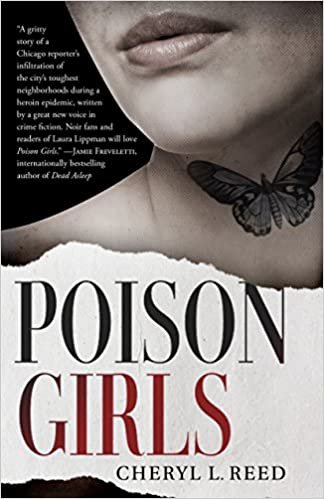Book Review: Poison Girls
Poison Girls. Cheryl L. Reed. Diversion Books, September 12, 2017, Trade Paperback and E-book, 372 pages.
Reviewed by Dennis Hetzel.
“My teeth felt gritty, as if I’d been sucking on the couch lint in my sleep.”
Those are the memorable and very noir-like words of Chicago Times reporter Natalie Delaney when she wakes up in a strange man’s house after a night of heavy drinking—all in pursuit of a story. Natalie is the main character in Cheryl Reed’s novel, Poison Girls. No couch lint here. Poison Girls works exceedingly well as a crime thriller, and it transcends the cop-thriller-procedural genre by at least the distance between Chicago’s poshest suburbs and grittiest neighborhoods. It’s a powerful story framed by what happens when these worlds collide.
Sometimes fiction is the best path to fresh insight. In this case, the story illuminates the widening gulfs in our country between the upper one percent—you know, the ones who were born on third base and think they hit triples—and the bottom 10 percent. Reed understands Chicago’s neighborhoods, its moods, and its cynical, dark corners. And it’s a story with much to say about corruption, not just the official kind that Chicagoans know so well, but the corruption and erosion of local journalism. The rot seems to fester both within and without.
More than anything, though, Poison Girls is Natalie Delaney’s story. She’s a single, thirty-something female journalist coping with the suicide of the one love in her life and the subtle and not-so-subtle sexism inside and outside a newsroom where every reporter worries if today is the last day on the job.
As one of the best reporters in the Times newsroom, Natalie prays she has a measure of job security. She knows how to do whatever it takes to get a story, and she takes pride in her ability to distance herself from her subjects.
But, not this time.
Events, including her own troubled past, drive Natalie to care too much about a pair of young girls who have the potential to help her respond to a mandate from her bosses: Get scoops and put human faces on the opioid crisis.
The driving premise of her editors, along with the rest of the local media, couldn’t be more cynical. Everyone understands, with no need to say it, that a story about rich, white girls dying of drug overdoses in mysterious ways is far-bigger news than the deaths of poor blacks.
The “Poison Girls” are suburban girls from prominent families who are dying from “poison,” a lethal form of heroin, as they journey into inner city neighborhoods seeking riskier highs. Why and how is this happening? Is it revenge by black street gangs, disgusted minority-community leaders, or something even more evil? In a very Chicago-like way, several of the victims are connected to the powerful brokers of local politics. It’s also bad publicity for the city at a time when a senator from Hyde Park is running for president and the city leaders are going all-out to host the Olympics.
Natalie meets Libby and Anna, two teens who are equal parts victims and connectors. It’s the opening Natalie needs, and she works hard to convince the girls to let her observe the journey, never imagining she’ll become a participant. It isn’t long before Natalie is deeply imbedded in a world that challenges her ethics, leaves her deeply conflicted, and puts her career and life at risk.
Writing a literary crime novel requires an ability to respect the genre but avoid clichés (such as “ink-stained wretches”) and pat dialogue. Reed succeeds in all but a few, scattered spots, and the story gets stronger, and more twisted, the deeper you go.
Reed’s comfort with the subject matter makes sense. She’s a former editor and reporter for the Chicago Sun-Times, an award-winning investigative reporter and the author of Unveiled: The Hidden Lives of Nuns, which chronicled time she spent living with nuns. Currently a professor at Syracuse University, Reed drew on experiences reporting drug use among girls for this, her debut novel.
It’s a terrific debut, indeed. Let’s hope Cheryl Reed gives Natalie Delaney more stories to tell.

